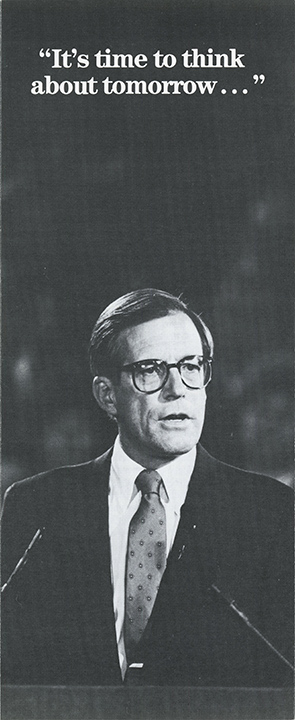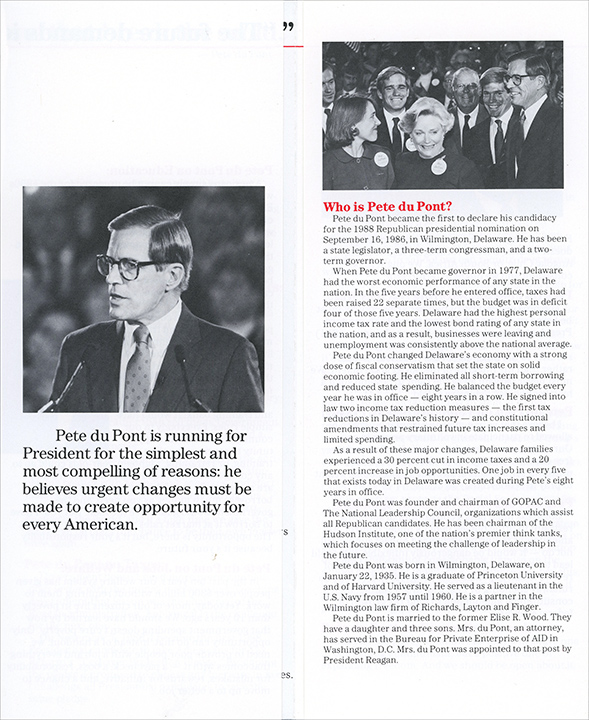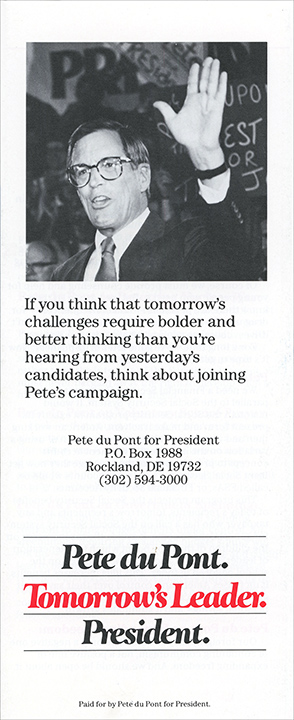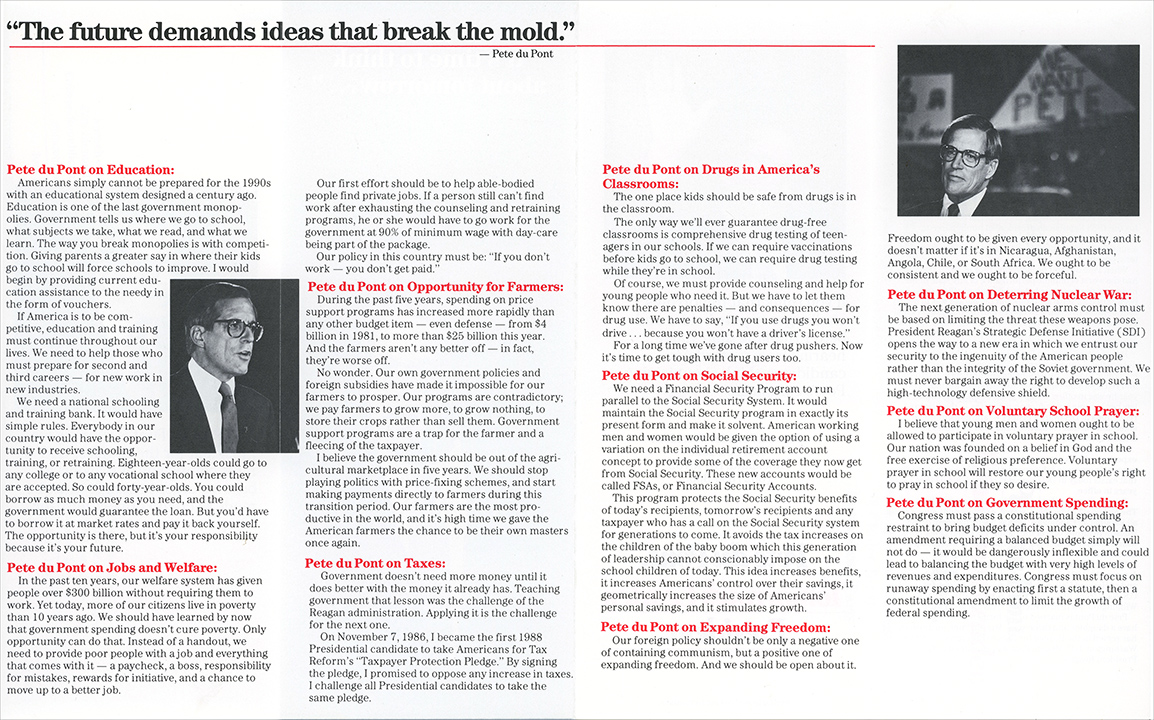- Campaign
Literature « 1988
Republican Presidential Primary «
Pete du Pont for President
1988 Republican Presidential Primary
Pete du Pont for President
 |
 |
 |

Brochure
"It's time to think about tomorrow..."
Pete du Pont is running for President for the simplest and most compelling of reasons: he believes urgent changes must be made to create opportunity for every American.
Who is Pete du Pont?
Pete du Pont became the first to declare his candidacy for the 1988 Republican presidential nomination on September 16, 1986, in Wilmington, Delaware. He has been a state legislator, a three-term congressman, and a twoterm governor.
When Pete du Pont became governor in 1977, Delaware had the worst economic performance of any state in the nation. In the five years before he entered office, taxes had been raised 22 separate times, but the budget was in deficit four of those five years. Delaware had the highest personal income tax rate and the lowest bond rating of any state in the nation, and as a result, businesses were leaving and unemployment was consistently above the national average.
Pete du Pont changed Delaware's economy with a strong dose of fiscal conservatism that set the state on solid economic footing. He eliminated all short-term borrowing and reduced state spending. He balanced the budget every year he was in office—eight years in a row. He signed into law two income tax reduction measures—the first tax reductions in Delaware's history—and constitutional amendments that restrained future tax increases and limited spending.
As a result of these major changes, Delaware families experienced a 30 percent cut in income taxes and a 20 percent increase in job opportunities. One job in every five that exists today in Delaware was created during Pete's eight years in office.
Pete du Pont was founder and chairman of GOPAC and The National Leadership Council, organizations which assist all Republican candidates. He has been chairman of the Hudson Institute, one of the nation's premier think tanks, which focuses on meeting the challenge of leadership in the future.
Pete du Pont was born in Wilmington, Delaware, on January 22, 1935. He is a graduate of Princeton University and of Harvard University. He served as a lieutenant in the U.S. Navy from 1957 until 1960. He is a partner in the Wilmington law firm of Richards, Layton and Finger.
Pete du Pont is married to the former Elise R. Wood. They have a daughter and three sons. Mrs. du Pont, an attorney, has served in the Bureau for Private Enterprise of AID in Washington, D.C. Mrs. du Pont was appointed to that post by President Reagan.
"The future demands ideas that break the mold."
—Pete du Pont
Pete du Pont on Education:
Americans simply cannot be prepared for the 1990s with an educational system designed a century ago. Education is one of the last government monopolies. Government tells us where we go to school, what subjects we take, what we read, and what we learn. The way you break monopolies is with competition. Giving parents a greater say in where their kids go to school will force schools to improve. I would begin by providing current education assistance to the needy in the form of vouchers.
If America is to be competitive, education and training must continue throughout our lives. We need to help those who must prepare for second and third careers—for new work in new industries.
We need a national schooling and training bank. It would have simple rules. Everybody in our country would have the opportunity to receive schooling, training, or retraining. Eighteen-year-olds could go to any college or to any vocational school where they are accepted. So could forty-year-olds. You could borrow as much money as you need, and the government would guarantee the loan. But you'd have to borrow it at market rates and pay it back yourself. The opportunity is there, but it's your responsibility because it's your future.
Pete du Pont on Jobs and Welfare:
In the past ten years, our welfare system has given people over $300 billion without requiring them to work. Yet today, more of our citizens live in poverty than 10 years ago. We should have learned by now that government spending doesn't cure poverty. Only opportunity can do that. Instead of a handout, we need to provide poor people with a job and everything that comes with it—a paycheck, a boss, responsibility for mistakes, rewards for initiative, and a chance to move up to a better job.
Our first effort should be to help able-bodied people find private jobs. If a person still can't find work after exhausting the counseling and retraining programs, he or she would have to go work for the government at 90% of minimum wage with day-care being part of the package.
Our policy in this country must be: "If you don't work—you don't get paid."
Pete du Pont on Opportunity for Farmers:
During the past five years, spending on price support programs has increased more rapidly than any other budget item—even defense—from $4 billion in 1981, to more than $25 billion this year. And the farmers aren't any better off—in fact, they're worse off.
No wonder. Our own government policies and foreign subsidies have made it impossible for our farmers to prosper. Our programs are contradictory; we pay farmers to grow more, to grow nothing, to store their crops rather than sell them. Government support programs are a trap for the farmer and a fleecing of the taxpayer.
I believe the government should be out of the agricultural marketplace in five years. We should stop playing politics with price-fixing schemes, and start making payments directly to farmers during this transition period. Our farmers are the most productive in the world, and it's high time we gave the American farmers the chance to be their own masters once again.
Pete du Pont on Taxes:
Government doesn't need more money until it does better with the money it already has. Teaching government that lesson was the challenge of the Reagan administration. Applying it is the challenge for the next one.
On November 7, 1986, I became the first 1988 Presidential candidate to take Americans for Tax Reform's "Taxpayer Protection Pledge." By signing the pledge, I promised to oppose any increase in taxes. I challenge all Presidential candidates to take the same pledge.
Pete du Pont on Drugs in America's Classrooms:
The one place kids should be safe from drugs is in the classroom.
The only way we'll ever guarantee drug-free classrooms is comprehensive drug testing of teenagers in our schools. If we can require vaccinations before kids go to school, we can require drug testing while they're in school.
Of course, we must provide counseling and help for young people who need it. But we have to let them know there are penalties—and consequences—for drug use. We have to say, "If you use drugs you won't drive ... because you won't have a driver's license."
For a long time we've gone after drug pushers. Now it's time to get tough with drug users too.
Pete du Pont on Social Security:
We need a Financial Security Program to run parallel to the Social Security System. It would maintain the Social Security program in exactly its present form and make it solvent. American working men and women would be given the option of using a variation on the individual retirement account concept to provide some of the coverage they now get from Social Security. These new accounts would be called FSAs, or Financial Security Accounts.
This program protects the Social Security benefits of today's recipients, tomorrow's recipients and any taxpayer who has a call on the Social Security system for generations to come. It avoids the tax increases on the children of the baby boom which this generation of leadership cannot conscionably impose on the school children of today. This idea increases benefits, it increases Americans' control over their savings, it geometrically increases the size of Americans' personal savings, and it stimulates growth.
Pete du Pont on Expanding Freedom:
Our foreign policy shouldn't be only a negative one of containing communism, but a positive one of expanding freedom. And we should be open about it. Freedom ought to be given every opportunity, and it doesn't matter if it's in Nicaragua, Afghanistan, Angola, Chile, or South Africa. We ought to be consistent and we ought to be forceful.
Pete du Pont on Deterring Nuclear War:
The next generation of nuclear arms control must be based on limiting the threat these weapons pose. President Reagan's Strategic Defense Initiative (SDI) opens the way to a new era in which we entrust our security to the ingenuity of the American people rather than the integrity of the Soviet government. We must never bargain away the right to develop such a high-technology defensive shield.
Pete du Pont on Voluntary School Prayer:
I believe that young men and women ought to be allowed to participate in voluntary prayer in school. Our nation was founded on a belief in God and the free exercise of religious preference. Voluntary prayer in school will restore our young people's right to pray in school if they so desire.
Pete du Pont on Government Spending:
Congress must pass a constitutional spending restraint to bring budget deficits under control. An amendment requiring a balanced budget simply will not do—it would be dangerously inflexible and could lead to balancing the budget with very high levels of revenues and expenditures. Congress must focus on runaway spending by enacting first a statute, then a constitutional amendment to limit the growth of federal spending.
If you think that tomorrow's challenges require bolder and better thinking than you're hearing from yesterday's candidates, think about joining Pete's campaign.
Pete du Pont for President
P.O. Box. 1988
Rockland, DE 19732
(302) 594-3000
Pete du Pont.
Tomorrow's Leader
President.
Paid for by Pete du Pont for President.

